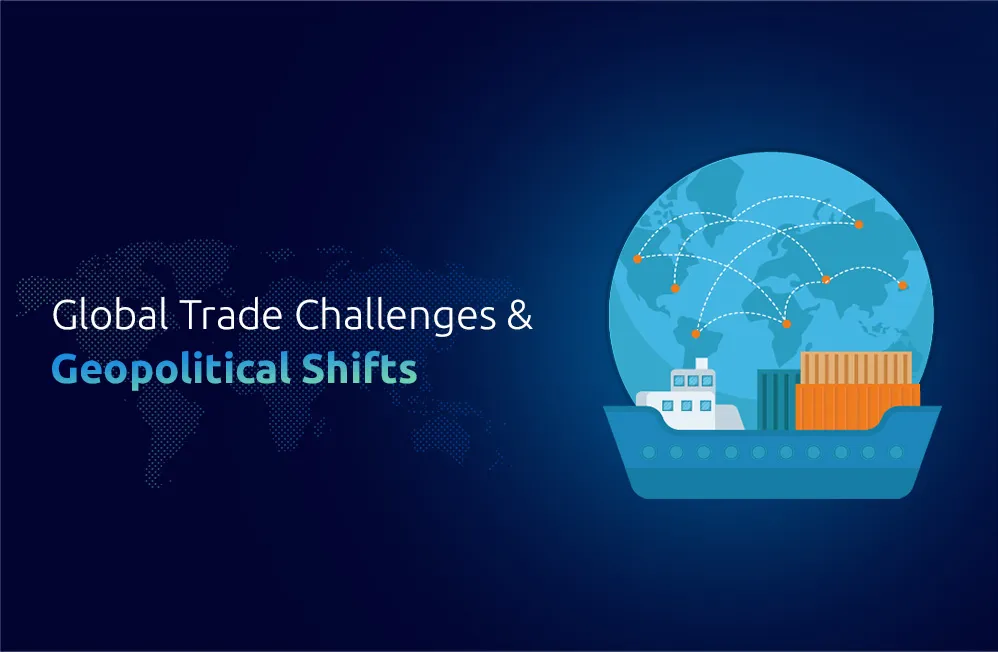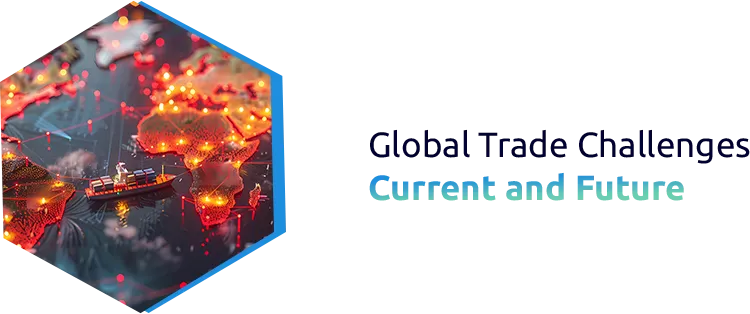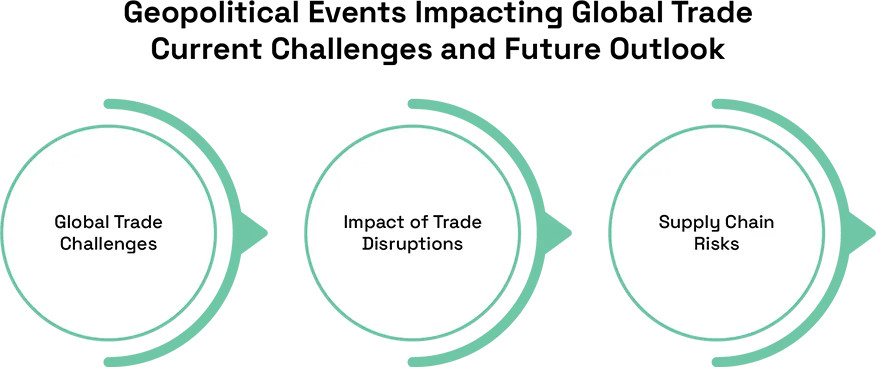Insight
Geopolitical events have always influenced global trade dynamics be it political tensions, trade wars, economic sanctions, or regulatory changes which have a ripple effect across industries and societies worldwide. The last few years have been even more disruptive, so businesses must continue to learn and adapt as challenges emerge.
Global trade has become an unpredictable experience. Tariffs, political instability, and a changing regulatory environment all present geopolitical risks that can lead directly to disruption in a supply chain, whether that’s delays, higher costs, or loss of market access. In this article, we look into the ongoing impacts of geopolitical events on global trade, particularly industries that have intricate supply chains and operate globally- and guide how businesses adapt their operations to reduce such risks.
Understanding the Global Geopolitical Landscape
Global politics has become less stable, directly impacting international trade. Trade wars, military conflicts, or economic sanctions between large countries immediately impact industries that depend on cross-border trade and international cooperation for trade or revenue. Such disruptions could lead to production delays or cost increases, as well as market uncertainty — all of which can affect industries dependent on just-in-time logistics or components with specialized uses that invest heavily in supply chain partnerships for their profitability.
Imposing tariffs on goods and services often gets tense between major economies. For industries that depend on global supply chains for high-value intermediate goods, such as specialized parts for aircraft or automotive manufacturing, these trade restrictions can be particularly devastating when they fall into place; what used to be a straightforward supply chain process can rapidly evolve into an incredibly costly minefield once barriers go up between markets.
The Impact of Trade Wars and Tariffs
Influence of Trade Wars and Tariffs International trading industries have suffered significant challenges, especially from trade wars such as the ongoing trade disagreements between the United States and China. Tariffs and sanctions have led to higher prices, production delays, and companies scrambling for alternative suppliers. They are creating challenges for companies re-evaluating their sourcing strategies or transferring production to other locations to absorb the increased costs of tariffs.
The auto industry, which depends on the timely delivery of parts from across several countries, is especially exposed to these realignments. Tech or medical suppliers are critical infrastructure providers impacted by supply chain interruption related to changes in trade policies.
Sanctions and Regulatory Changes: Their Influence on Global Markets
Sanctions are another significant geopolitical factor influencing international trade. Governments around the world impose sanctions as a political tactic against other nations; typically these target specific industries, preventing certain countries from accessing critical goods, services or technologies that businesses that trade internationally require accessing. Sanctions also create bottlenecks in supply chains for high-tech products or equipment which have limited supply options due to international trading restrictions.
Regulation plays an integral part in global trade. Stringent data privacy laws, for instance, can prevent companies from moving data across borders. Countries have begun imposing cybersecurity, storage, and compliance regulations which make it harder for businesses to run smoothly – something particularly detrimental to industries like technology and healthcare that rely heavily on global compliance to run efficiently.
Supply Chain Disruptions: An Emerging Concern
Geopolitical disturbances are becoming an ever-growing concern across businesses globally — especially for firms using just-in-time inventory systems that are heavily dependent on just-in-time inventories. Political unrest or trade barriers that block access to raw materials or components required by production lines can trigger a shutdown, pushing costs higher as companies race to line up alternative suppliers. Sectors such as tech and health care that demand precision and reliability are particularly vulnerable to supply disruptions. Having the right parts on time, the quality of your product, and regulatory compliance are challenges on their own.
The Part of Technology in Navigating Geopolitical Risks
Technology has provided essential assistance by reducing its impact as companies are confronted with geopolitical risks. From real-time tracking systems to data analytics, businesses are using tech to regain control of their supply chains and increase transparency as their edge in forecasting disruptions is becoming an issue.
Artificial intelligence & machine learning tech are now used to predict supply chain disruptions, enabling companies to adjust their sourcing and manufacturing activities in real time. Automation and robotics in manufacturing have also proved essential to enable more flexible production, making it less vulnerable to supply shocks from geopolitical turbulence.
Future Outlook: Navigating Geopolitical Risks
Geopolitical risks will likely remain disruptive in global trade in the upcoming year, from political tensions and economic sanctions to trade wars. In such an environment, companies must embrace flexible approaches such as alternative sourcing plans, consolidating with a few key suppliers, and extending operations to other parts of the globe to weather geopolitical storms effectively.
Conclusion
Geopolitical events are still a major force influencing trade worldwide. Trade wars, sanctions, regulatory changes, and supply chain disruptions are all risks businesses must be ready to manage effectively if they venture into international operations. Companies can mitigate the effects better by leveraging technology to diversify supply sources and designing contingency plans to navigate geopolitical uncertainty.
At One Union Solutions, we understand this need for proactive planning by our clients; that is why our logistical expertise and solutions remain at your service to keep businesses operating successfully in an unpredictable global environment. To stay one step ahead we offer logistical expertise as part of our logistical solutions services that ensure businesses keep running smoothly despite any challenges imposed upon them by geopolitical uncertainty.
Did You Know,
Research reveals that over 40% of companies were forced to modify their supply chains due to political unrest and trade policies changes within the past five years, forcing them to adapt their strategies in response to unpredictable environments and shifting trade policies. Businesses employing flexible supply chain models are better equipped for managing these risks successfully.
FAQs
How do trade wars affect global industries?
Ans: Trade wars result in tariffs that increase costs and disrupt supply lines. This group of tariffs could hit industries with a particularly heavy reliance on global sourcing, leading to production delays and higher costs.
What can businesses do to prepare for geopolitical disruptions?
Experts say that businesses can prepare for this scenario with supply chain diversification of their suppliers, investments in technology tools to warn of disruptions, and contingency plans that include alternate suppliers and production strategies.
How can technology help manage geopolitical risks?
It will also help organizations enlarge transparency, optimize supply chains and respond promptly to disruptions. In today’s melting geopolitical environment, real-time tracking systems, AI and data analytics tools are fundamental to efficient operations.
What do sanctions mean for global trade?
Ans: Sanctions make it harder for certain countries to obtain key items for production, including goods, services and technologies, which can create bottlenecks in supply chains and force production delays that increase costs and complicate efforts to meet production timelines.
Why is adaptability so important in global trade?
Skills allows companies to adapt quickly to shifting geopolitical conditions. Adopting flexible sourcing, manufacturing and logistics practices can help companies mitigate disruptions & remain competitive in an uncertain market environment.












